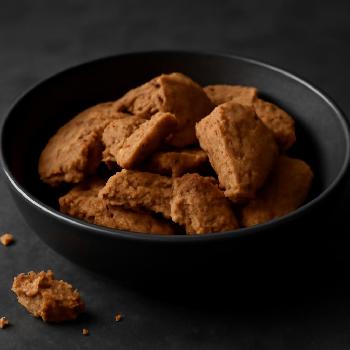Cooking Tips > Troubleshooting > Recipe Fixes > What should I do if my cookies are too hard?
What should I do if my cookies are too hard?
Hard cookies are a common baking problem. This tutorial provides troubleshooting steps and solutions to soften cookies that are too hard, covering potential causes and preventative measures for future batches.

Understanding Why Cookies Become Hard
Several factors contribute to cookies turning out hard. Overbaking is a primary culprit, as it removes too much moisture. An imbalance in ingredients, specifically too much flour or not enough fat (butter, shortening, or oil), can also lead to a dry and hard texture. Additionally, using the wrong type of flour or not creaming the butter and sugar properly can affect the final result. Sometimes, storing cookies improperly can also lead to them becoming hard over time.
Immediate Fix: Softening Hard Cookies
If your cookies are already hard, here are a few methods to soften them:
1. The Bread Slice Method: Place the cookies in an airtight container with a slice of fresh bread. The moisture from the bread will be absorbed by the cookies, softening them. Check after a few hours and replace the bread if it becomes dry.
2. Apple Slice Method: Similar to the bread method, place the cookies in an airtight container with a slice of apple (such as gala or fuji). The apple's moisture will help to soften the cookies. Check periodically and replace the apple slice if needed.
3. Microwaving (Use with Caution): Wrap one or two cookies in a slightly damp paper towel and microwave for 5-10 seconds. Be careful not to overheat them, as this can make them even harder once they cool. This method is best for immediate consumption.
Preventing Hard Cookies in the Future: Ingredient Adjustments
To prevent hard cookies in future baking endeavors, consider the following adjustments:
1. Measure Flour Accurately: Use a kitchen scale for the most accurate measurement of flour. If using measuring cups, spoon the flour into the cup and level it off with a knife, avoiding packing the flour.
2. Ensure Adequate Fat: Make sure you're using the correct amount of butter, shortening, or oil called for in the recipe. Fat contributes to tenderness and moisture. Consider adding a tablespoon or two more of fat if you consistently have issues with hard cookies.
3. Proper Creaming: Cream together the butter and sugar until light and fluffy. This incorporates air into the batter, which helps create a tender crumb.
4. Use Brown Sugar: Brown sugar contains molasses, which adds moisture and chewiness to cookies. Substituting some of the granulated sugar with brown sugar can help prevent hardness.
5. Consider Using Cake Flour: Cake flour has a lower protein content than all-purpose flour, resulting in a more tender cookie. Substitute a portion of the all-purpose flour with cake flour.
Preventing Hard Cookies in the Future: Baking Techniques
Correct baking techniques are just as important as ingredient ratios. Here's what to consider:
1. Avoid Overbaking: Use a timer and check the cookies a minute or two before the recommended baking time. Cookies should be lightly golden around the edges but still slightly soft in the center. They will continue to bake and firm up as they cool on the baking sheet.
2. Use Parchment Paper or a Silicone Baking Mat: These prevent the cookies from sticking to the baking sheet and overbaking on the bottom.
3. Rotate Baking Sheets: If your oven bakes unevenly, rotate the baking sheet halfway through the baking time to ensure even cooking.
4. Let Cool on Baking Sheet: Allow the cookies to cool on the baking sheet for a few minutes before transferring them to a wire rack to cool completely. This allows them to set properly and prevents them from becoming too brittle.
5. Calibrate Your Oven: Use an oven thermometer to check the accuracy of your oven's temperature. Many ovens are not accurately calibrated and may bake hotter or cooler than indicated. Adjust baking times accordingly.
Proper Storage
How you store your cookies can also affect their texture. Store cooled cookies in an airtight container at room temperature. Avoid storing them in the refrigerator, as this can dry them out. If you need to store them for a longer period, freeze them in an airtight container or freezer bag. Thaw them completely before serving. Avoid leaving cookies exposed to air for prolonged periods.
FAQ
-
Can I soften hard cookies in the oven?
While possible, it's not recommended as it can easily lead to further drying. If you must, lightly sprinkle the cookies with water and bake at a very low temperature (around 200°F or 93°C) for a few minutes, checking frequently. -
Why are my cookies hard and crumbly?
This likely indicates a lack of fat or too much flour. Review your recipe and ensure you're using the correct proportions of ingredients, paying close attention to accurate measurement of flour and proper creaming of butter and sugar. -
Is it better to underbake or overbake cookies?
It's generally better to slightly underbake cookies. They will continue to bake as they cool, resulting in a softer, chewier texture. Overbaking leads to hard, dry cookies. -
What if I used the wrong type of flour?
Using the wrong type of flour can definitely impact the texture of your cookies. All-purpose flour is the standard for most cookie recipes. If you accidentally used bread flour, which has a higher protein content, it can result in tougher cookies. Cake flour will produce a more tender cookie, so it's generally a good substitute, but may affect the structure slightly.
